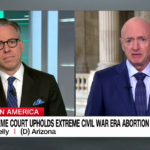
As G.O.P. Digs In on Debt Ceiling, Democrats Try Shaming McConnell

Senator Mitch McConnell says Republicans will not support raising the federal borrowing limit. Weeks before a potential default, Democrats do not appear to have a strategy for doing so.


WASHINGTON — With the government’s full faith and credit on the line, the Democratic leadership’s strategy for raising the federal borrowing limit seems to be this: Try to shame the impervious Senate Republican leader, Mitch McConnell of Kentucky, into capitulating.
They unsuccessfully tried this strategy in 2016, when Mr. McConnell blockaded the nomination of Judge Merrick B. Garland to the Supreme Court, maintaining that voters should decide who would name the next justice when they picked a president that November. They tried and failed again late last year, weeks before a presidential election, when the death of Justice Ruth Bader Ginsburg opened a Supreme Court seat for Judge Amy Coney Barrett to fill, no matter what voters had to say a month and a half later.
Now, with a potential government default weeks away, Democrats are again demanding that Mr. McConnell back down — this time from his vow to lead Republicans in opposition to raising the statutory limit on the Treasury Department’s authority to borrow.
“Let’s be clear,” Mr. McConnell wrote on Twitter on Wednesday. “With a Democratic president, a Democratic House and a Democratic Senate, Democrats have every tool they need to raise the debt limit. It is their sole responsibility. Republicans will not facilitate another reckless, partisan taxing and spending spree.”
While Democratic attention is largely focused on passing a sprawling, 10-year, $3.5 trillion social policy bill, a potentially more consequential deadline is rapidly approaching: Sometime in October, Treasury Secretary Janet L. Yellen has told Congress, her ability to shuffle money from government account to government account will be exhausted. The Treasury will no longer be able to pay all the nation’s creditors, unless Congress raises or suspends the limit on issuing debt.
A default would be unprecedented, and it could lead to a far-reaching financial crisis — or at least a crisis in confidence for the governments, banks and other creditors that keep the federal government afloat by purchasing its bonds and notes.
But Mr. McConnell is adamant that if Democrats insist on spending trillions of dollars on infrastructure, climate change and social welfare, they must bear exclusive responsibility for raising the borrowing limit. A purely Democratic vote to raise the debt ceiling, of course, would fortify Republican political attacks on what they characterize as an out-of-control, “socialist” party.
Understand the Infrastructure Bill
-
- One trillion dollar package passed. The Senate passed a sweeping bipartisan infrastructure package on Aug. 10, capping weeks of intense negotiations and debate over the largest federal investment in the nation’s aging public works system in more than a decade.
- The final vote. The final tally in the Senate was 69 in favor to 30 against. The legislation, which still must pass the House, would touch nearly every facet of the American economy and fortify the nation’s response to the warming of the planet.
- Main areas of spending. Overall, the bipartisan plan focuses spending on transportation, utilities and pollution cleanup.
- Transportation. About $110 billion would go to roads, bridges and other transportation projects; $25 billion for airports; and $66 billion for railways, giving Amtrak the most funding it has received since it was founded in 1971.
- Utilities. Senators have also included $65 billion meant to connect hard-to-reach rural communities to high-speed internet and help sign up low-income city dwellers who cannot afford it, and $8 billion for Western water infrastructure.
- Pollution cleanup: Roughly $21 billion would go to cleaning up abandoned wells and mines, and Superfund sites.
“Mitch McConnell is the most scrutable leader; he’s not a bluffer,” said Scott Jennings, a former McConnell aide and political strategist in Kentucky. “All you have to do is listen to what he’s saying. He is not going to budge.”
There are two problems with Mr. McConnell’s argument. First, the reason the government is crashing into its debt limit is the tax cutting and free spending of the Trump years. As Democrats note, raising the limit is equivalent to paying the nation’s credit card bill for past actions, not future spending.
The last time the issue surfaced, in August 2019, Congress and President Donald J. Trump suspended the debt limit through July 31 of this year. On Aug. 2, Treasury reset the debt limit to $28.4 trillion, and the government crashed through it days later, less than seven months into President Biden’s term.
Second, a debt ceiling increase will almost certainly need at least the acquiescence of Senate Republicans to overcome a filibuster and move to a vote. Mr. McConnell would like Democrats to add a debt ceiling increase to the social policy bill, which is being drafted under budget rules that would allow it to pass with 51 Senate votes.
But Democrats said weeks ago that they would not do that. Given the difficulty in reaching near-unanimous Democratic agreement on the measure — and a series of procedural obstacles they would have to clear — it would most likely be impossible to get it to the House and Senate floors in time to avoid a default.
Democrats say that they helped Mr. Trump and Republican leaders deal with the debt limit, and that fairness dictates bipartisanship now, especially on such a consequential matter. Hence, the shame campaign.
“If Senator McConnell and Senate Republicans choose to default to avoid paying debts they helped rack up under President Trump, it will devastate the economy and irreparably discredit our country’s financial standing, their party and themselves,” Justin Goodman, a spokesman for Senator Chuck Schumer of New York, the majority leader, said on Wednesday. “Senator McConnell will go down as the first person in history to force a default, and every single American will know the Senate Republicans are to blame.”
Mr. McConnell is not the Democrats’ only target; they say other Senate Republicans, such as Mitt Romney of Utah, Susan Collins of Maine and Lisa Murkowski of Alaska, understand what is at stake. Democratic leaders are likely to attach a debt ceiling increase to an emergency spending bill that includes funding for Hurricane Ida reconstruction, wildfire management and Afghan refugee resettlement; they will then dare Republican senators from Louisiana, Idaho and Montana and other interested lawmakers to vote no later than this month.
Biden’s 2022 Budget
The 2022 fiscal year for the federal government begins on October 1, and President Biden has revealed what he’d like to spend, starting then. But any spending requires approval from both chambers of Congress. Here’s what the plan includes:
-
- Ambitious total spending: President Biden would like the federal government to spend $6 trillion in the 2022 fiscal year, and for total spending to rise to $8.2 trillion by 2031. That would take the United States to its highest sustained levels of federal spending since World War II, while running deficits above $1.3 trillion through the next decade.
- Infrastructure plan: The budget outlines the president’s desired first year of investment in his American Jobs Plan, which seeks to fund improvements to roads, bridges, public transit and more with a total of $2.3 trillion over eight years.
- Families plan: The budget also addresses the other major spending proposal Biden has already rolled out, his American Families Plan, aimed at bolstering the United States’ social safety net by expanding access to education, reducing the cost of child care and supporting women in the work force.
- Mandatory programs: As usual, mandatory spending on programs like Social Security, Medicaid and Medicare make up a significant portion of the proposed budget. They are growing as America’s population ages.
- Discretionary spending: Funding for the individual budgets of the agencies and programs under the executive branch would reach around $1.5 trillion in 2022, a 16 percent increase from the previous budget.
- How Biden would pay for it: The president would largely fund his agenda by raising taxes on corporations and high earners, which would begin to shrink budget deficits in the 2030s. Administration officials have said tax increases would fully offset the jobs and families plans over the course of 15 years, which the budget request backs up. In the meantime, the budget deficit would remain above $1.3 trillion each year.
Reputation aside, Mr. McConnell has lost before. In 2015, the Senate voted over his adamant opposition to curtail the federal government’s post-Sept. 11 surveillance of U.S. phone records. He vowed this year to oppose a Senate organizing resolution to give Democrats control of the chamber unless the new majority promised to protect the legislative filibuster. Then he blinked.
“I don’t think anyone believes he will say, ‘They nailed me for being hypocritical — I give up,’” Senator Brian Schatz, Democrat of Hawaii, said of Mr. McConnell. “But it is possible, in fact it’s imperative, that we demonstrate that the modern Republican Party is just too dangerous for the American economy and for American democracy.”
The attack on the Capitol on Jan. 6 was “exhibit A,” Mr. Schatz added. “This is exhibit B.”
Some Republicans clearly are queasy with the brinkmanship. While they are angry that Democrats passed a $1.9 trillion pandemic rescue bill over united Republican opposition — and are now doing the same with their social policy bill — they know the stakes of a government default.
“The Democrats have added enormous amounts of debt, including the $1.9 trillion package, now $3.5 trillion on top of that, so they bear the responsibility for increasing the debt limit,” Ms. Collins said. “I don’t, however, want to see our country default, so we’ll have to see what happens.”
Senator Richard C. Shelby of Alabama, the top Republican on the Appropriations Committee, told reporters this week: “After stops and starts, we will pass a debt limit of some kind. Because otherwise the alternative is not good, not good either way.”
But Antonia Ferrier, a former spokeswoman for Mr. McConnell, said he would not be this adamant if he were not reflecting the will of the Senate Republican conference.
“The left trying to move Senator McConnell with shame or pressure is like trying to move Mount Everest with a light breeze,” she said.
Emily Cochrane contributed reporting.
Source: https://www.nytimes.com/2021/09/15/us/politics/debt-ceiling-mcconnell.html

















